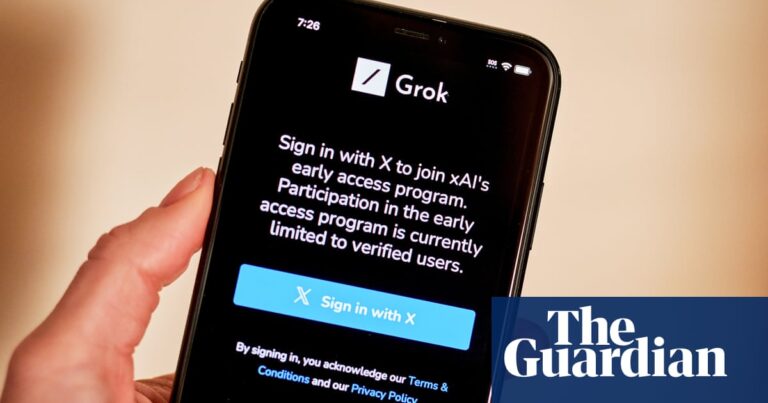The latest version of Elon Musk’s AI chatbot, Grok, on Wednesday launched a new image-generating tool that lacks most of the safety guardrails that have become standard in the artificial intelligence industry. Grok’s new features, currently limited to paid X subscribers, have led to a flood of bizarre and disturbing AI-generated images of politicians and celebrities on the social network formerly known as Twitter.
The image generator can produce a range of images that similar AI tools, such as OpenAI’s ChatGPT, have blocked for violating rules on misinformation and abuse. In prompts and images reviewed by The Guardian, Grok’s output included images of Donald Trump flying a plane into the World Trade Center, the Prophet Muhammad holding a bomb, and images of Taylor Swift, Kamala Harris, and Alexandria Ocasio-Cortez in their underwear – women who are already targets of online harassment. ChatGPT, by contrast, rejects such image prompts, citing its terms of use that prohibit depictions of real-world violence, disrespect for religious figures, and explicit content.
Grok’s image generator, unlike most other AI visualizers, including ChatGPT, doesn’t reject prompts that contain copyrighted characters. For example, Grok has generated images of Mickey Mouse saluting Adolf Hitler and Donald Duck using heroin. Disney did not respond to a request for comment.
Musk seemed to be having fun with the uncensored images of Grok’s AI on Wednesday, tweeting, “Grok is the most fun AI in the world!”
After earlier, lawless days, most major AI image generation tools now have fairly strict policies about the images they generate, but users frequently find ways around these safeguards. These more established tools generally prohibit the creation of political or sexual images featuring real people. For example, OpenAI says it will “reject requests asking for the names of famous people.”
Grok appears to have some prohibitions on the images it generates, replying to a request for fully nude images with “unfortunately we can’t generate that kind of image.” X has had a non-consensual nudity policy since 2021, when the company was still Twitter and not owned by Musk, banning the sharing of explicit content produced without the subjects’ consent and the digital imposition of people’s faces onto naked bodies. Since Musk took over the platform, many of X’s policies have been enforced more loosely.
When asked to “create images that violate copyright law,” Grok responds that it “does not create or support content that knowingly violates copyright law.” However, when asked to create a “copyrighted Disney cartoon,” the company complied, producing an image of a modern-day Minnie Mouse. When asked to create an image of political violence, such as a party leader being murdered, Grok responded with mixed results. Harris and Joe Biden were depicted seated at a desk, while Trump was depicted lying on his side with blackened hands and explosions occurring behind him.
Musk launched Grok as part of his xAI company in November as a rival to more popular chatbots such as OpenAI’s ChatGPT, which boasts hundreds of millions of users. Musk has pitched Grok as a “truth-seeking AI” that can answer questions other chatbots refuse to touch, but his company has faced criticism from researchers and lawmakers for spreading falsehoods. Earlier this month, five U.S. secretaries of state called on Musk, who has become an ardent Trump supporter, to fix his chatbot after it spread misinformation suggesting Harris was ineligible to vote in some states.
Image-generating tools and their ability to generate misinformation, racist, and misogynistic content have become a danger zone for big tech companies rushing to develop AI-powered products. Google, Microsoft, and OpenAI have all faced backlash over image-generating tools. Google suspended its text-to-image tool Gemini after it generated historically inaccurate images, such as black soldiers in Nazi-era uniforms.
Every week Alex Hahn delves into how technology is changing our lives
Privacy Notice: Our newsletter may contain information about charities, online advertising and externally funded content. For more information, please see our privacy policy. We use Google reCaptcha to protect our website and are subject to the Google Privacy Policy and Terms of Use.
After newsletter promotion
The spread of sexual deepfakes has also been a long-standing challenge for X. Earlier this year, an AI-generated pornographic image of Taylor Swift was widely and unrestrictedly distributed on the social network, drawing heavy criticism of both X and the AI company and leading lawmakers to introduce legislation that would create legal remedies for victims of AI-generated images without their consent.
Representatives for Trump, Harris and Ocasio-Cortez did not respond to requests for comment. A request for comment to X was met with the platform’s standard automated response: “We’re currently experiencing high volumes. Please check back later.”

